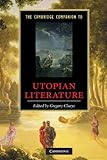The Cambridge companion to utopian literature [electronic resource] / edited by Gregory Claeys.
Material type: TextSeries: Cambridge companions to literaturePublication details: Cambridge ; New York : Cambridge University Press, 2010.ISBN:
TextSeries: Cambridge companions to literaturePublication details: Cambridge ; New York : Cambridge University Press, 2010.ISBN: - 9780521886659 (hardback : alk. paper)
- 9780521714143 (pbk. : alk. paper)
- 809/.93372 22
- PN56.U8 C36 2010
| Item type | Current library | Call number | Copy number | Status | Date due | Barcode |
|---|---|---|---|---|---|---|
 General Books
General Books
|
CUTN Central Library Literature | 809/.93372 (Browse shelf(Opens below)) | 1 | Available | 1560 |
Includes bibliographical references and index.
Machine generated contents note: Preface Gregory Claeys; Brief chronology of key works of utopian literature and thought; Part I. History: 1. The concept of utopia Fátima Vieira; 2. Thomas More's Utopia: sources, legacy and interpretation J. C. Davis; 3. Utopianism after More: the Renaissance and Enlightenment Nicole Pohl; 4. Varieties of nineteenth-century utopias Kenneth M. Roemer; 5. The origins of dystopia: Wells, Huxley and Orwell Gregory Claeys; Part II. Literature: 6. Utopia, dystopia and science fiction Peter Fitting; 7. Utopia and Romance Patrick Parrinder; 8. Feminism and utopianism Alessa Johns; 9. Colonial and post-colonial utopias Lyman Tower Sargent; 10. 'Non-western' utopian traditions Jacqueline Dutton; 11. Ecology and utopia Brian Stableford; Further reading.
License restrictions may limit access.
"Since the publication of Thomas More's genre-defining work Utopia in 1516, the field of utopian literature has evolved into an ever-expanding domain. This Companion presents an extensive historical survey of the development of utopianism, from the publication of Utopia to today's dark and despairing tendency towards dystopian pessimism, epitomised by works such as George Orwell's Nineteen Eighty-Four and Margaret Atwood's The Handmaid's Tale. Chapters address the difficult definition of the concept of utopia, and consider its relation to science fiction and other literary genres. The volume takes an innovative approach to the major themes predominating within the utopian and dystopian literary tradition, including feminism, romance and ecology, and explores in detail the vexed question of the purportedly 'western' nature of the concept of utopia. The reader is provided with a balanced overview of the evolution and current state of a long-standing, rich tradition of historical, political and literary scholarship"--


There are no comments on this title.